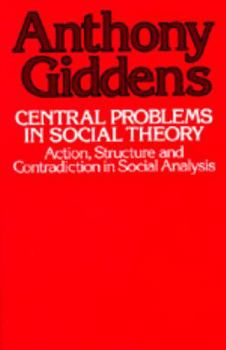Central Problems in Social Theory: Action, Structure, and Contradiction in Social Analysis
Select Format
Select Condition 
Book Overview
In this new and brilliantly organized book of essays, Anthony Giddens discusses three main theoretical traditions in social science that cut across the division between Marxist and non-Marxist sociology: interpretive sociology, functionalism, and structuralism.
Beginning with a critical examination of the importance of structuralism for contemporary sociology, the author develops a comprehensive account of what he calls "the theory of structuration." One of the main themes is that social theory must recognize, as it has not done hitherto, that all social actors are knowledgeable about the social systems they produce and reproduce in their conduct. In order to grasp the significance of this, he argues, we have to reconsider some of the most basic concepts in sociology.
In particular, Giddens argues, it is essential to recognize the significance of time-space relations in social theory. He rejects the distinction between synchrony and diachrony, or statics and dynamics, involved in both structuralism and functionalism, and offers extensive critical commentary on the latter as an approach to sociology.
The book, which can be described as a "non-functionalist manifesto," breaks with the three main theoretical traditions in the social sciences today while retaining the significant contributions each contains. In so doing Giddens discusses a range of fundamental problem areas in the social sciences: power and domination, conflict and contradiction, and social transformation. He concludes with an overall appraisal of the key problems in social theory today.
Beginning with a critical examination of the importance of structuralism for contemporary sociology, the author develops a comprehensive account of what he calls "the theory of structuration." One of the main themes is that social theory must recognize, as it has not done hitherto, that all social actors are knowledgeable about the social systems they produce and reproduce in their conduct. In order to grasp the significance of this, he argues, we have to reconsider some of the most basic concepts in sociology.
In particular, Giddens argues, it is essential to recognize the significance of time-space relations in social theory. He rejects the distinction between synchrony and diachrony, or statics and dynamics, involved in both structuralism and functionalism, and offers extensive critical commentary on the latter as an approach to sociology.
The book, which can be described as a "non-functionalist manifesto," breaks with the three main theoretical traditions in the social sciences today while retaining the significant contributions each contains. In so doing Giddens discusses a range of fundamental problem areas in the social sciences: power and domination, conflict and contradiction, and social transformation. He concludes with an overall appraisal of the key problems in social theory today.
Format:Paperback
Language:English
ISBN:0520039750
ISBN13:9780520039759
Release Date:November 1979
Publisher:University of California Press
Length:294 Pages
Weight:0.85 lbs.
Dimensions:0.8" x 5.5" x 8.2"
Customer Reviews
2 ratings
great for theorists, not for lazy sundays
Published by Thriftbooks.com User , 19 years ago
Giddens' approach to theory takes functional-structuralism and gives it a diachronic facelift. One of the greatest flaws in structuralism (sorry LS) is that it does not address problems related to social change in context of time and place. Giddens' attempts to do this, albeit with a few flaws, but all in all is a sound theoretical base from which to pull from when creating models. Kind of repetitive at times, considering it is a collection of articles rather than one manuscript.
Philosophy and Sociology
Published by Thriftbooks.com User , 24 years ago
It seems unneccessarily complicated riddle to solve to us, sociologists. actually Giddens's writing style in this title is not that easy to grasp judging from sociological convention. and worse he cited too many names like Saussure, Hegel, Levi-Strauss, Heidegger, Husserl and even Derrida and Wittgenstein! those that makes readers wandering around jargons from philosophy. because this book stem from the controversial atmosphere of 70s when French Structuralism prevailed over intellectural map. Giddens wanted to conter their assertions. we can see he was right at 80s when structurism collapsed into trendy postmodernist jargons. Anyway I recommend to read this title if u read 'The Constitution of Society'. which title is not that hostile to reader like this title. but something lacks on it. You can find what miss in later masterpiece. This title is somewhat earlier endeavor to clarify his theory of structuration. so thorems were not that clearly founded. it makes it the way to hostility to readers but sometimes this kind of imperfection is more valuable to portray one's image of theory.






